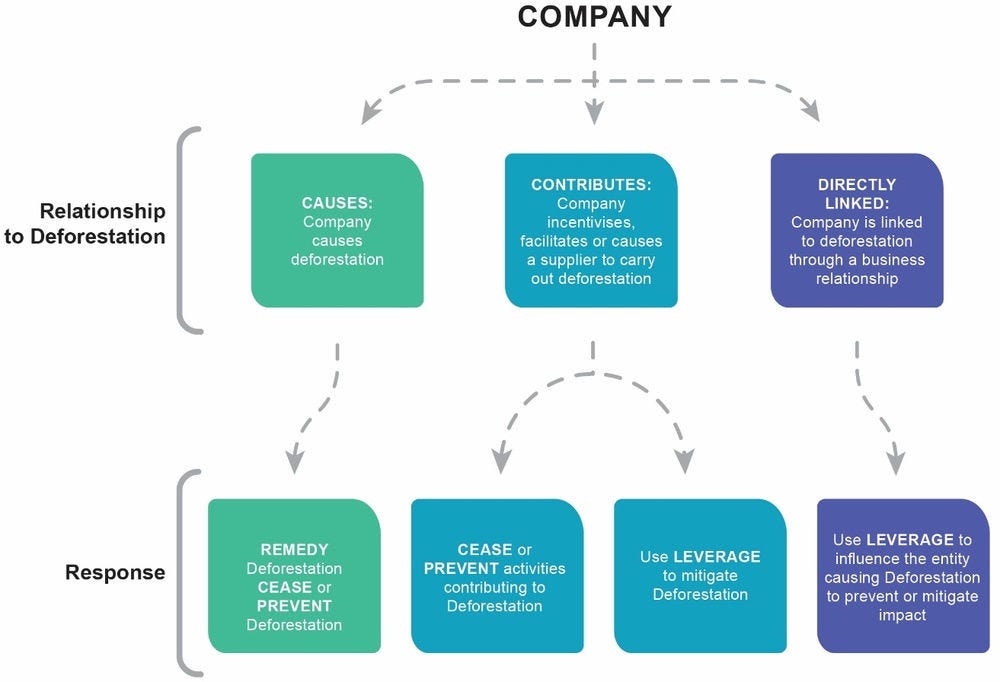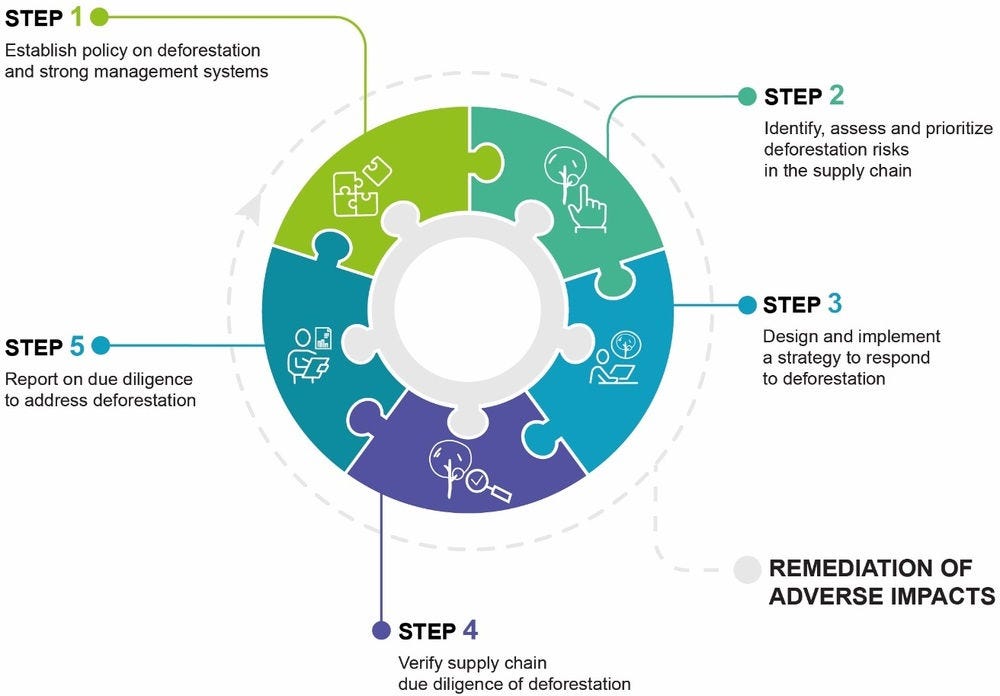This chapter introduces the overall concept of risk-based due diligence as set out by the OECD-FAO Guidance for Responsible Agricultural Supply Chains.
OECD-FAO Business Handbook on Deforestation and Due Diligence in Agricultural Supply Chains

Due diligence in agricultural supply chains
Abstract
“Due diligence” is understood as the process through which enterprises identify, prevent, mitigate and account for how they address the actual and potential adverse impacts of their own operations, their supply chain and other business relationships. This is the approach to due diligence recommended by the OECD-FAO Guidance for Responsible Agricultural Supply Chains (OECD-FAO Guidance) and the cross-sectoral Due Diligence Guidance for Responsible Business Conduct (OECD, 2018, p. 15[18]). Due diligence in this context is thus an integral part of business decision-making and risk management. The due diligence framework of the OECD-FAO Guidance can be used by all enterprises operating along agricultural supply chains, from upstream production to downstream retail.
The OECD-FAO Guidance due diligence framework
The risk-based due diligence framework in the OECD-FAO Guidance describes the steps an enterprise can take to identify, prevent and address risks in their operations, supply chains and business relationships. Figure 3 illustrates the five‑step process, as well as integrating the Remediation of Adverse Impacts, which forms a sixth step within the cross-sectoral Due Diligence Guidance for Responsible Business Conduct. The protection of forests and the avoidance of deforestation are mentioned on several occasions in the OECD-FAO Guidance but are not discussed in detail. As such, this Handbook supplements the OECD-FAO Guidance by using risk-based due diligence to identify and address deforestation risks in global agricultural supply chains.
Figure 3. The OECD-FAO Guidance due diligence framework
What is meant by “risk” for due diligence
For many enterprises, the term “risk” means primarily risks to the enterprise – financial risk, market risk, operational risk, reputational risk, etc. In the field of responsible business conduct, risk refers to the severity and likelihood of adverse impacts on people, the environment and society that enterprises cause, contribute to, or to which they are directly linked through business operations and sourcing practices. In other words, it is an outward-facing approach to risk. It is important to note that there are many potential underlying drivers of deforestation. Factors such as poverty, human rights abuses, the rights, resources and capacities of local communities and Indigenous Peoples, the uncertain status of land and forest tenure rights, corruption and weaknesses in governance and law enforcement may all act as root causes for deforestation risks.
Defining the involvement of an enterprise with regard to adverse impacts
An enterprise can either cause adverse impacts, contribute to them, or be directly linked to them through its operations, products and services by a business relationship (see Figure 4). This understanding of the relationship of the enterprise to deforestation, or the risk of deforestation, is important, as it guides an enterprise on what it is expected to do in response to the impact. Depending on its relationship to the impact, taking action to respond to deforestation or deforestation risks could mean taking steps to directly remedy the impact, cease activities causing the impact or prevent the potential impact, or use leverage to influence the entity causing the impact.
Figure 4. Addressing adverse impacts based on examples of relationships to the impact

Source: Adapted from OECD (2018[18]), OECD Due Diligence Guidance for Responsible Business Conduct and OECD-FAO (2016[1]), OECD-FAO Guidance on Responsible Agricultural Supply Chains, Box 1.2.
An enterprise causes an adverse impact if the enterprise’s actions by themselves result in the impact. For example, if an agricultural enterprise produces crops on land that it has cleared of forest, it is understood to cause that impact. Impacts can also result from inaction (omission).
An enterprise contributes to an adverse impact if its activities, in combination with the activities of other entities, result in the impact, or if the enterprise causes, facilitates or incentivises another entity to cause an adverse impact. Contribution must be substantial, meaning that this does not include minor or trivial contributions. For example, an agricultural company may be contributing if it acquires a land concession for development of a plantation, knowing that the land will need to be cleared of forests in order to grant the concession.
An enterprise is directly linked to an adverse impact when the impact is linked to its operations, products or services by a business relationship. An enterprise’s business relationships include entities in the supply chain that are directly linked with its operations, products and services. Business relationships include relationships beyond contractual, first tier or immediate relationships. This could include for example a producer, processor or trader in the supply chain from which the enterprises receives its products or raw materials.
